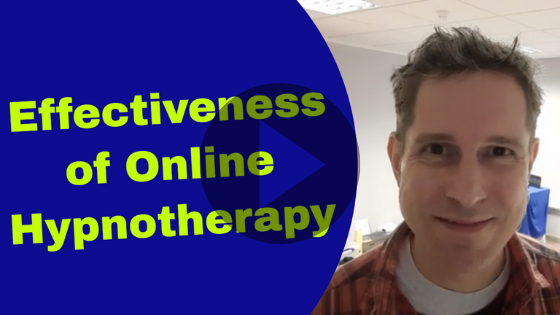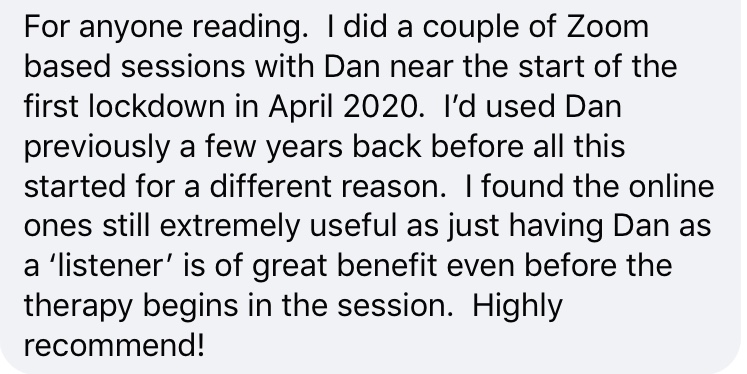Required
The Effectiveness of Online Hypnotherapy: Skype and Zoom Hypnotherapy Sessions
The Effectiveness of Online Hypnotherapy: Skype and Zoom Hypnotherapy Sessions
Online hypnotherapy sessions are something that I’ve been successfully using with people for many years. Yet whereas in the past it was mainly people abroad or who live outside a reasonable travelling distance, with Covid-19 and everything that goes with it (like social distancing and lockdowns), Skype and Zoom online hypnotherapy sessions have boomed.
There are many advantages that come with online hypnotherapy. As long as you have a reasonable internet connection, you don’t need to live near Ely or Newmarket to work with me, you save on the time and cost of travel, and if you are struggling with something like anxiety or health anxiety, it can make accessing effective hypnotherapy much easier.
This year I’ve helped more people than ever with online hypnotherapy and for issues such as generalised anxiety, health or coronaphobia anxiety, stress, fears and weight loss. It’s been great to be able to continue helping people during the pandemic lockdowns.
Whenever online hypnotherapy, through platforms such as Skype and Zoom, gets mentioned, one of the first things people want to know is whether it is as effective as face-to-face hypnotherapy, or even whether hypnotherapy online is effective at all.
In my own experience it certainly can be effective, subject to the usual ‘rules’ of effective hypnotherapy that include someone being motivated and committed to make changes and to take action, and being willing to put techniques and strategies in place both in and outside the sessions. Yet rather than only rely on the positive results I get when working online, let’s have a look at some of the evidence for the effectiveness of online therapy.
Online Hypnotherapy: Why Attitudes Matter
We already know from research that your attitude and expectations about therapy can have a huge impact upon the results you achieve. Naturally the same is true with online therapy.
The attitudes and expectations toward online therapy from both you and your therapist have an important effect on the efficacy of the treatment. Before the Covid-19 pandemic, I know of many hypnotherapists who hold a negative attitude about online therapy and who considered it less effective in their work with clients.
However, the pandemic has pushed (or increased) the volume of hypnotherapists now working online with their clients. Face-to-face sessions have been interrupted, some people are isolating or minimising social contact, and some have been forced to stop because of restrictions, and many clients and therapists have, as a result, transitioned to online therapy sessions.
To help understand attitudes towards online therapy, Békés and Aafjes-van Doorn (Psychotherapists’ attitudes toward online therapy during the COVID-19 pandemic, 2020) collected data from 145 psychotherapists from North America and Europe (note that although this was psychotherapists rather than hypnotherapists I think the same attitudes, expectations and experiences are applicable). Participants in their research reported on their past experiences with online psychotherapy, their preparations of their online psychotherapy sessions during the pandemic, the challenges they encountered in online sessions, and their attitudes toward online psychotherapy more generally.
Despite being pushed by the pandemic into more online therapy sessions, overall they found that “despite the stressful contextual factors of the COVID-19 pandemic, attitudes toward online psychotherapy were reasonably positive.”
As mentioned above, I think we can translate these results from psychotherapy over to the realm of hypnotherapy, given the close relationship between them. These results are important because if you want to increase the likelihood of obtaining positive results from your therapy sessions, then you want to work with a hypnotherapist who is confident and positive when working with you online.
In fact, the report authors comment how online experience has been found to lead to more positive attitudes toward it, something that I certainly agree with when I think of my early online hypnotherapy sessions some eight or nine years ago, compared to how I’ve been working online with people during the pandemic, and which I expect only to grow into the future.
This research suggests that if you are planning on working with a hypnotherapist online then it’s definitely worth asking them about their experience of working in this way, their confidence doing so and their attitudes towards online hypnotherapy generally (either by asking them directly or through observing and interacting with them during an initial consultation). For the field of hypnotherapy, this pandemic may have a silver lining in increased access to effective therapeutic services for those in need of help.
As well as attitudes towards online hypnotherapy being an important factor in its effectiveness, we also need to consider whether a client and hypnotherapist can establish a good working relationship when working online. This therapeutic relationship includes factors such as the agreement between therapist and client on goals for therapy, agreement between therapist and client on specific tasks of therapy, and the therapist–client bond.
These are essential factors underlying successful therapy across therapeutic models. And so it’s pretty important that you and your hypnotherapist are able to work together effectively, whether that’s face-to-face in the same room or online.
This is an area that Simpson & Reid (Therapeutic alliance in videoconferencing psychotherapy: A review. 2014) reviewed in the context of videoconferencing psychotherapy (or therapy conducted by video, such as Skype or Zoom). They found that the evidence ‘overwhelmingly supported‘ the notion that a good quality therapeutic relationship can be developed in psychotherapy by video conference, with clients rating bond and presence at least equally as strongly as in-person settings.
Here, again, we have good evidence that hypnotherapy can work effectively online, and that factors that support successful therapy can be achieved and maintained.
So we know that you and your therapist benefit from a positive attitude towards online hypnotherapy, and that it is possible to work effectively in this way. This leads us on nicely to looking at the effectiveness of online hypnotherapy in terms of positive outcomes and results.
The Effectiveness of Online Hypnotherapy
In my research of the evidence for the effectiveness of online hypnotherapy, or even therapy as a whole, I did find some helpful scientific results. In my view, therapy online isn’t really that different to therapy when sitting in the same room (or at least in the way I work to help people in my hypnotherapy sessions). It’s also important to keep in mind that here I am talking about video type online hypnotherapy (through platforms such as Skype and Zoom) rather than anything automated, self-directed online programmes or text therapy services.
Barak et al (A Comprehensive Review and a Meta-Analysis of the Effectiveness of Internet-Based Psychotherapeutic Interventions, 2008), carried out a review and meta-analysis of research to examine the effectiveness of online therapy. The studies included in their review involved a total of 9,764 clients who were treated through various Internet-based psychological interventions for a variety of problems. Their results suggested that the effectiveness of online therapy is pretty similar to that of face-to-face therapy, and the authors noted there was strong support for the increased adoption of online psychological interventions within therapy.
As they concluded,
“The findings presented in this meta-analytic review provide much support for the application of psychotherapeutic interventions through the Internet, using various approaches, methods, and online modalities, to treat various problems differentially but effectively; online therapy is especially effective for treating anxiety and stress—effects that last after therapy ends—and, on the average, is as effective as face-to-face intervention.”
Thus the findings here, based on ninety two studies and over nine and a half thousand clients, suggests that online psychological interventions are as effective as those carried out face-to-face. As technology has improved and we have all become more used to communicating online, I’d expect positive results and client satisfaction with online hypnotherapy to have solidified, if not improved.
In addition to these positive results, we also have the findings from Backhaus et al (Videoconferencing psychotherapy: a systematic review, 2012), who carried out a review of the use of videoconferencing psychotherapy (VCP). They found that online therapy delivered by video (which these days would cover Skype, Zoom or Facetime) has similar clinical outcomes to face to face therapy.
“The results indicate that VCP is feasible, has been used in a variety of therapeutic formats and with diverse populations, is generally associated with good user satisfaction, and is found to have similar clinical outcomes to traditional face-to-face psychotherapy.”
Again, strong support from these reviews of the evidence that online hypnotherapy can be effective in helping you to achieve positive results from your therapy. One particular area of hypnotherapy that has been studied is for Irritable Bowel Syndrome (where due to the nature of the condition, travel may be a problem for some people).
Online Hypnotherapy: Irritable Bowel Syndrome
One area where we have specific evidence for the effectiveness of online hypnotherapy is with regard to Irritable Bowel Syndrome (IBS).
In fact, the field of hypnotherapy has a mass of positive evidence for the effectiveness of hypnosis for IBS (have a read here:Hypnotherapy for Irritable Bowel Syndrome: The Evidence for the Effectiveness Of IBS Hypnosis). For example, Tan, Hammond & Gurrala (Hypnosis and irritable bowel syndrome: a review of efficacy and mechanism of action. American Journal of Clinical Hypnosis, 2005), found that hypnosis consistently produces significant results and improves the symptoms of IBS in the majority of patients, and that these positive effects can be sustained over a considerable period of time.
Hasan, Pearson, Morris & Whorwell (Skype hypnotherapy for irritable bowel syndrome: effectiveness and comparison with face-to-face treatment. International Journal of Clinical and Experimental Hypnosis, 2019) showed that similar positive results can be achieved by using hypnosis online via Skype where it isn’t possible to meet in person with a hypnotherapist (perhaps due to the severity of IBS symptoms making it difficult to travel).
Their study demonstrated that Skype hypnotherapy is highly effective, “when Skype and traditionally delivered hypnotherapy were compared, there was no significant difference in outcomes.”
In their study, the Skype hypnotherapy had an impact on all the individual symptoms associated with IBS as well as improving non-colonic symptoms, quality of life, anxiety and depression issues. They did identify a marginal difference in effectiveness when the hypnotherapy was online rather than face to face, but I think these differences could be overcome by developing a good working relationship and having a positive attitude towards the hypnotherapy and towards working online. In addition, where you would otherwise be unable to access hypnotherapy, due to time constraints, your particular needs or problem, or due to Covid-19 restrictions, online hypnotherapy allows you to access beneficial help where otherwise you may be unable to get any help.
Skype and Zoom Hypnotherapy
All of the available evidence supports the effectiveness of hypnotherapy delivered online, something that I’ve certainly found to be the case when I work with people by Zoom or Skype. It’s perhaps worth adding that, whilst I am looking at online hypnotherapy delivery in this article, there is a whole other ton of evidence not covered here around the effectiveness of hypnotherapy itself. The research covered here suggests that this evidenced effectiveness of hypnotherapy will transfer very well when delivered through online platforms.
It’s important that you and your hypnotherapist have a positive attitude towards working online, as well as the usual positive attitude towards working together to achieve your goals and towards being active in your own progress towards those positive results.
During the Covid-19 pandemic I’ve been working with more and more people online, whether through necessity (e.g. due to lockdown restrictions), through client choice (e.g. due to demands on their time or because of anxiety around Covid-19) or due to their location (where my clients are spread across the UK and beyond). I have certainly found that it is very possible to achieve great results from your sessions when working online, and the research described here only serves to reinforce that.
If you would like a chat about online hypnotherapy and how it can work for you, then do get in touch and we can arrange a free initial consultation to chat things through so you can decide how it would work for you.
To your health and well-being,
Dan Regan
Online Skype and Zoom Hypnotherapy
Face-to-face hypnotherapy in Ely & Newmarket
Note: After I published this article on my Facebook page, I received this feedback post about the effectiveness of Zoom hypnotherapy from someone I helped online during the first Covid-19 pandemic lockdown:
Need some help with anxiety, stress, worry and fear? Book your Complimentary Hypnotherapy Strategy Session with Dan now: Appointments
Find out what other people have said after their hypnotherapy sessions with Dan: Hypnotherapy Testimonials
And check out these powerful hypnosis downloads that can start helping you right away with anxiety, confidence and more: Hypnosis Downloads
References:
Backhaus, A., Agha, Z., Maglione, M.L., Repp, A., Ross, B., Zuest, D., Rice-Thorp, N.M., Lohr, J. and Thorp, S.R., 2012. Videoconferencing psychotherapy: a systematic review. Psychological services, 9(2), p.111.
Barak, A., Hen, L., Boniel-Nissim, M. and Shapira, N.A., 2008. A comprehensive review and a meta-analysis of the effectiveness of internet-based psychotherapeutic interventions. Journal of Technology in Human services, 26(2-4), pp.109-160.
Békés, V. and Aafjes-van Doorn, K., 2020. Psychotherapists’ attitudes toward online therapy during the COVID-19 pandemic. Journal of Psychotherapy Integration, 30(2), p.238.
Hasan, S.S., Pearson, J.S., Morris, J. and Whorwell, P.J., 2019. Skype hypnotherapy for irritable bowel syndrome: effectiveness and comparison with face-to-face treatment. International Journal of Clinical and Experimental Hypnosis, 67(1), pp.69-80.
Simpson, S.G. and Reid, C.L., 2014. Therapeutic alliance in videoconferencing psychotherapy: A review. Australian Journal of Rural Health, 22(6), pp.280-299.
Tan, G., Hammond, D.C. and Gurrala, J., 2005. Hypnosis and irritable bowel syndrome: a review of efficacy and mechanism of action. American Journal of Clinical Hypnosis, 47(3), pp.161-178.
Get Your Copy Right Now…
Subscribe to Dan’s Digest filled with tips, strategies and techniques and get instant access to your free rapid relaxation hypnosis audio track.
Enjoy feeling and being more mentally calm and physically relaxed right now:







0 Comments